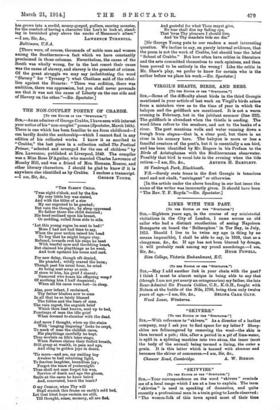THE NON-COUPLET POETRY OF CRABBE.
[To TIT E1.110I OF TEN "tircorxxoa.") Sta,—As an admirer of George Crabbe, 1 have seen with interest your notice of his" non-couplet " poems (Spectator, March 14th). There is one which has been familiar to me from childhood—I can hardly doubt the authorship—which I cannot find in any edition of his collected works. I know it as ascribed to "Crabbe," the last piece in a collection called The Poetical Primer, "selected and arranged for the use of children" by Mrs. Lawrence; published at Liverpool, 1849. The compiler was a Mies Rose D'Aguilar, who married Charles Lawrence of Mossby Hill, and was a friend of Mrs. Hemana, Roscoe, and other literary characters. I should be glad to know if it is anywhere else identified as by Crabbe. I enclose a transcript.
" THE SLEEPT CHILD.
'Twas eight o'clock, and by the fire
My rosy little boy was seated, And with the titles of a sire My ear expected to be greeted; But vain the thought; by sleep oppressed No father there the child descried; His head reclined upon his breast, Or nodding, rolled from side to side.
'Let this young rogue be sent to bed!'
More I had not had time to say, When the poor urchin raised his head To beg that he might longer stay. Refused, towards rest his steps he bent
With tearful eyes and throbbing heart, But claimed his playthings ELI he went, And took upstairs his horse and cart.
For new delay, though oft denied,
He pleaded; wildly craved the boon; Though past his usual hour, he cried At being sent away so soon.
If stern to him, his grief I shared;
Unmoved who hears his offspring weep P Of soothing him I half despaired;
When all his cares were lost—in sleep.
Alas, poor infant, I exclaimed, Thy father blushes now to scan In all that he so lately blamed The follies and the fears of man.
The vain regret, the anguish brief Which thou heat known, sent up to bed, Pourtrays of man the idle grief When doomed to slumber with the dead.
And more I thought, when up the stairs With 'longing lingering ' looks he crept, To mark of man the childish cares, His playthings carefully he kept. Thus mortals on life's later stage,
When Nature claims their forfeit breath, Still grasp at wealth, in pain and age,
And cling to golden joys in death.
'Tis morn—and see, my smiling boy Awakes to hail returning light, To fearless laughter, boundless joy; Forgot the tears of yesternight. Thus shall not man forget his woe, Survive of death and age the gloom, Smile at the cares he knew below
And, renovated, burst the tomb ?
0 my Creator, when Thy will Shall stretch this frame on earth's cold bed, Let that blest hope sustain me still, Till thought, sense, memory, all are fled.
And grateful for what Thou mayst give.
No tear shall dim my fading eye, That 'twas Thy pleasure I should live, And 'tis Thy mandate bids me die."
[Sir George Young puts to our readers a most interesting question. We incline to say, on purely internal evidence, that the poem is not the work of Crabbe, but should bear the label " School of Crabbe." But how often have critics in literature and the arts committed themselves to such opinions, and then been proved to be entirely in the wrong 1 Like the critic in Mr. Shaw'a play, we prefer to know for certain who is the author before we place his work.—En. Spectator.]










































 Previous page
Previous page